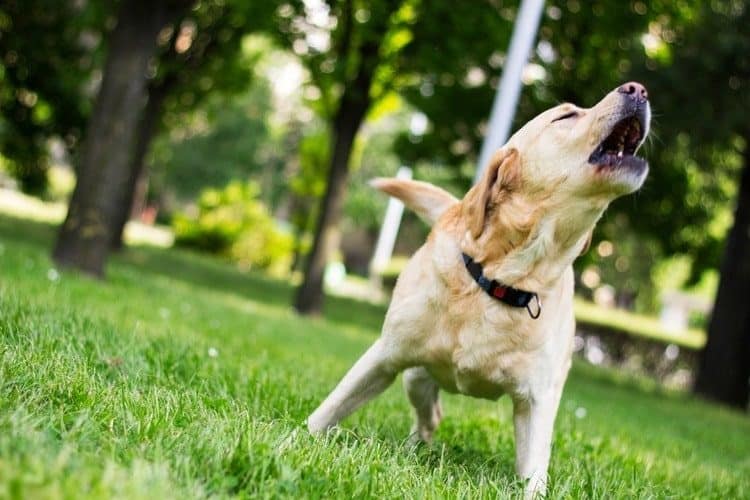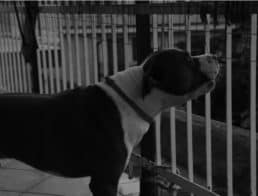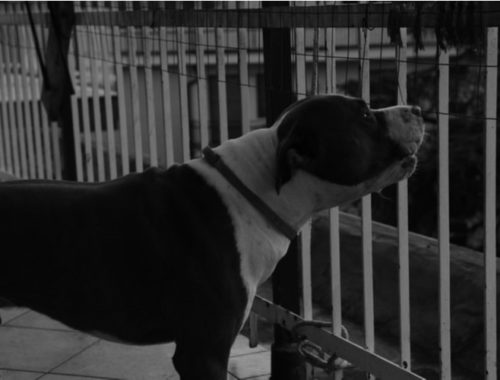Nothing can sour your relationship with those across the fence faster than a barking dog, so you want to stop your dog from barking at the neighbors before it becomes a point of contention. After all, it becomes an annoyance for you, them, and often the entire neighborhood. If your dog is a little too interested in your neighbor’s goings-on, read on to find out how you can help stop their barking.
Why Do Dogs Bark?

Simply put, barking is a dog’s way of communicating. Similar to the way you may lean on your fence and talk with your neighbor about the weather or an upcoming weekend, dogs bark to express their emotions or needs.1 Generally speaking, dogs may bark to express:
- Excitement: You just got home, and it’s time for a walk or game of fetch!
- Boredom: They’ve been locked in this yard all day without toys or any entertainment. Could somebody please let them out or at least send a squirrel or bird for them to watch?
- Territorialism: Most dogs have some innate protector gene. They want to protect what they see as theirs, including their yard, toys, bed, and you.2
- Fear: Loud, scary noises, strangers, dark clouds, you name it can send a dog into a barking frenzy simply out of fear.3
- Anxiety: Some dogs don’t like to be left alone, so they bark out of separation anxiety.4
- Pain: Dogs that are in pain or discomfort may bark to let you know that something is wrong. They will usually show other symptoms as well, including not eating, lameness, or unwillingness to exercise.5
- They need something: Similar to barking to express pain, dogs may also bark when they need something. Food, water, shade, to go outside/inside are all reasons your pup may alert you with barking.6
- Dementia: Our senior pups may start barking due to dementia. They don’t know why or sometimes that they are barking, or they may become disoriented and not know where they are.7
How to Stop Your Dog From Barking at the Neighbors

As with most training to correct behaviors in dogs, it’s best to find out why they’re barking in the first place. Identifying the cause of their barking can help you remove the stimulus or at least give you something to work with. Don’t expect your dog to stop barking at your neighbors overnight. It’s going to take some time and patience.
- Start early: Try not to wait until your dog’s barking has become a huge problem. It’s easier to fix in the early stages before they’ve become accustomed to doing it. However, if your dog has already reached professional level barking, don’t despair. It can still be corrected, it just may take a little more time and perseverance.
- Supervision, always: If your pup has a habit of running to the fence to bark at your neighbors the minute they’re let outside, make sure they’re not going out alone. Always accompany them and don’t let them stay out unsupervised. That way you’re there to give them a calm, yet firm “Quiet” or to redirect them if they go into a barking frenzy.
If your dog barks at the neighbors while indoors, you may have to restrict the areas of the house they have access to. For example, you might block your dog’s access to rooms with large windows or those nearest to your neighbors’ homes unless you’re with them, so you can redirect their behavior promptly should they start barking.
- Desensitization: Take your dog out into the yard, or the room where they’re most likely to bark at the neighbors, and have them sit next to you. Interact with the neighbor or let your dog listen to what they’re doing. If they bark tell them “Quiet”. Reward them with treats or affection when they are quiet. Make sure that they have been quiet for a few seconds before rewarding them so that they don’t associate a treat with barking. Continue to do this until they can easily go out into the yard or hear your neighbor’s come home without barking.8 This works best for dogs that are territorial or barking out of fear. It helps them to see that the neighbors aren’t scary and aren’t going to try to steal their yard.
- Distraction: Make sure your pup is always busy when the neighbors are outside or when they get home. Provide interactive toys, puzzles, or play with them during those high barking times so that they can focus on other things.
- Bark collars: Bark collars work by emitting a sound, vibration, static shock, or strong scent when a dog barks. They are meant to deter barking by providing negative reinforcement. Dogs can wear bark collars during the day while you’re gone or when outside, whenever they’re more likely to bark.
- Wear them out: You may have heard that a tired dog is a good dog, and most of the time that’s true. If a dog is worn out from a long run, swim, or game of fetch, they may lack the energy to get up and bark at the neighbors. Giving your dog plenty of exercise will not only help decrease barking, but it’s also a staple for a healthy life.
What Not to Do When Your Dog Barks at the Neighbors
There are some areas where dog parents run into trouble with training their dog not to bark. It’s important not to do the following because it can actually increase their likelihood of barking:
- Don’t yell at them: Yelling to a barking dog can actually increase barking. They think you’re joining in. Instead, use a calm, even tone and firmly say “Quiet” to get your point across. Reward them when they’re quiet for a few seconds.
- Inconsistency: This doesn’t mean that you need to stick with the same training method; it just means you need to keep your rewards and expectations consistent. If you want your dog to stay quiet for 10 seconds before a reward, make sure it’s 10 seconds every time.
- Don’t do too much at once: Keep your training sessions short and fun. This means 10-15 minutes two to three times a day. Any longer and you may outlast your dog’s attention span. You may alter your methods throughout the day as well. For example, do some desensitization in the morning, a distraction during the day, and desensitization again in the evening.
- Don’t wait: Again, getting a handle on your dog’s barking early on is always easier to deal with. Also, don’t wait to involve a professional. Veterinarians or professional trainers can help you if your dog is struggling with the quiet concept.
Excessive barking is often unpleasant for the whole family, but it can also be a major annoyance to your neighbors if your dog is constantly barking at them every time they walk outside their home. Following these tips will help you stop your dog from barking at the neighbors so you can maintain your friendly relationship with everyone in your neighborhood.
- Yin S. Barking Dogs: Noise or Communication? DrSophiaYin.com. Published November 15, 2010. Accessed April 19, 2021.
- Cole L. Protective, Jealous, and Possessive Behaviors. Sequoiahumane.org. Accessed April 19, 2021.
- Dumb Friends League. Understanding Aggressive Behavior in Dogs. Ddfl.org. Accessed April 19, 2021.
- ASPCA. Separation Anxiety. Aspca.org. Accessed April 19, 2021.
- SitStay. 7 Warning Signs of Pain in Dogs. Sitstay.com. Published March 5, 2018. Accessed April 19, 2021.
- Burger A. WOOF! The Barky Dog Series: Attention or Demand Barking. Orlandodogtraining.com. Published October 5, 2017. Accessed April 19, 2021.
- Khuly P. Dementia in Senior Dogs: 6 Ways to Deal With the Effects. Vetstreet.com. Published March 21, 2012. Accessed April 19, 2021.
- Horwitz D, Landsberg G. Overcoming Fears with Desensitization and Counterconditioning. Vcahospitals.com. Accessed April 19, 2021.
















